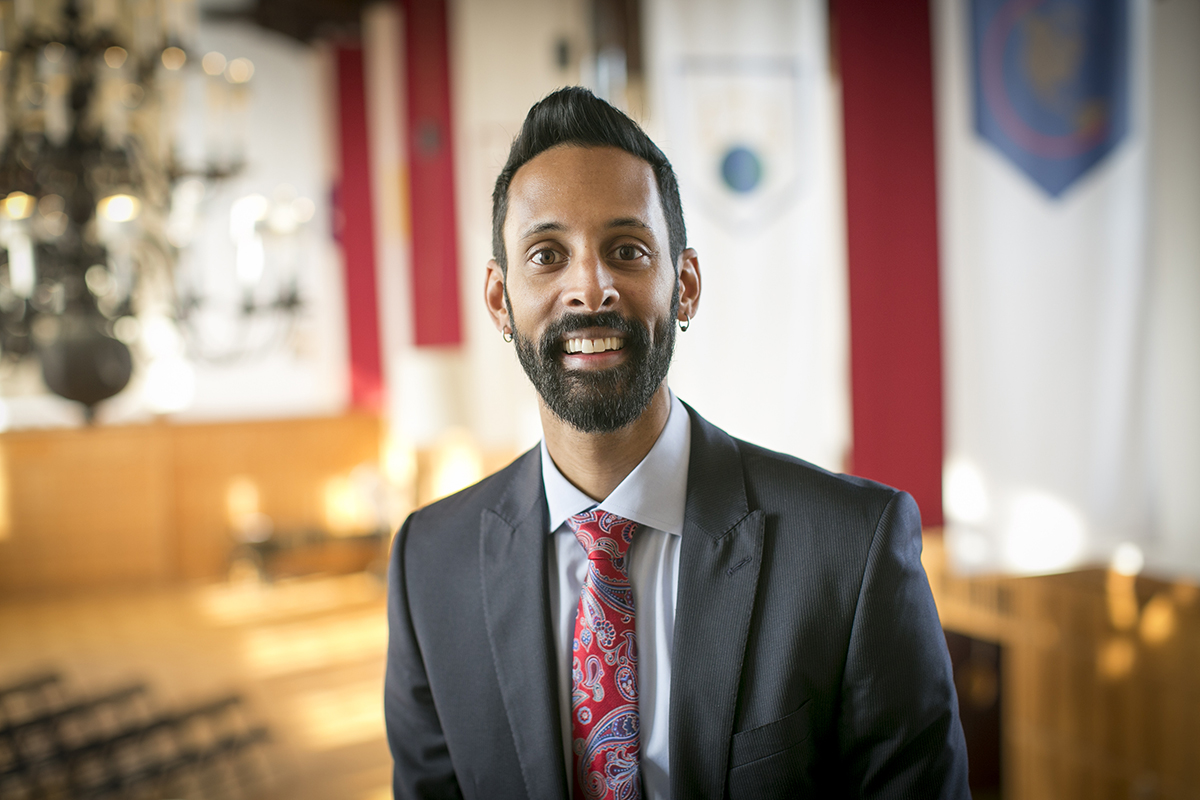New dean of students embraces breadth of Cornell
By Nancy Doolittle

Vijay Pendakur, Cornell’s new Robert W. and Elizabeth C. Staley Dean of Students, considers himself a global citizen.
A dual citizen of the United States and Canada, Pendakur spent his childhood traveling between the U.S. and India. He calls Chicago his hometown, where his father taught film at Northwestern University during his formative years. Pendakur, his wife, Katie, and their daughter, Mira, now look forward to the mix of rural and urban living offered by Ithaca and the surrounding Finger Lakes region.
Pendakur began working at Cornell Jan. 3 in a position that is as encompassing and as varied as his life experiences.
In a recent interview, he outlined three of his responsibilities: leading offices focused on issues of identity, safety and belonging; working with students experiencing a crisis and with others affected by those crises; and serving on the senior leadership team for Student and Campus Life and as a chief deputy to the vice president on all matters pertaining to students.
“Part of my role is to help offices within the dean of students area deepen and extend their impact on the Cornell community,” Pendakur said. Diversity and inclusion work “has to be done with all populations, cultivating strong allies and creating an environment of empowerment and safety across the entire campus,” he said.
The Office of the Dean of Students also works with such governance bodies as the Student Assembly and the Graduate and Professional Student Assembly and serves as a bridge between students and the administration. “I would like to have active sets of relationships with the assemblies and actual relationships with individual students, because it is through relationships that we build trust and mutual understanding,” he said.
Pendakur’s first priority is getting to know the people of Cornell and the Cornell culture – “the pulse of the place” – by listening to many campus voices and building “deep coalitions across shared interests.” He said social media helps him connect to students, staying current with students’ language, music and cultural sensibilities. It can be a social change agent by “giving voice to the voiceless, as we recently witnessed at Standing Rock.” But he also is concerned that social media can be used to promote a culture of meanness through trolling, burning and “clap-back” practices that are being confused for substantive debate. “That conceptual slippage between burning someone and engaging in rigorous debate is a threat to the issues we care so much about,” he said.
The dean of students also supports students experiencing a crisis and coordinates when needed between the student, the family and Cornell and community resources to manage the immediate situation and the broader “ripple effects” of the crisis. That response might include facilitating appropriate community forums for personal expression and healing or connecting those in need with counseling and support services.
Pendakur is an active advocate for student wellness. “Across higher education, we are seeing a rising prevalence of complex mental health concerns, stress and medical needs,” he said. “Wellness is part of the fundamental investment college and university campuses need to make to enhance learning. For example, if you are not sleeping, or are dealing with a body image issue or a deep sense of isolation, your organic chemistry or calculus class becomes secondary.”
He also is concerned about the well-being of staff members who work with students: “Their work has become more demanding because of the rising complexity of student health needs, and their health and wellness also is at risk,” Pendakur said. “We cannot give to students what we do not have ourselves, so our staff wellness is a key priority, too.”
With a bachelor's and master's in history and a doctorate in education, Pendakur has published numerous articles, book chapters and a recent book on equity issues in higher education. He said he is a “scholar practitioner” whose work with students is informed by emerging research; this background also allows him to connect with faculty, as he understands firsthand the pressure to publish and the hard work required to produce new knowledge.
Observing that “some of the toughest challenges to issues of dignity, identity and inclusion are happening in the classroom,” Pendakur hopes to partner with faculty, giving them resources to manage issues of micro-aggressions, stereotype threat and unconscious bias in classrooms, creating a productive environment for everyone. Dealing with diversity issues, inside or outside the classroom, “is foundational to preparing students to participate meaningfully in American civic democracy and to be part of solving enduring challenges of inequity and oppression in our society,” he said.
And that, Pendakur says, is what drew him to Cornell to begin with: The work is broad and encompassing, touching nearly all aspects of student life, preparing them to be global citizens.
Media Contact
Get Cornell news delivered right to your inbox.
Subscribe